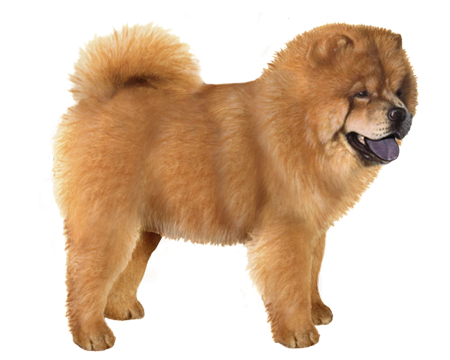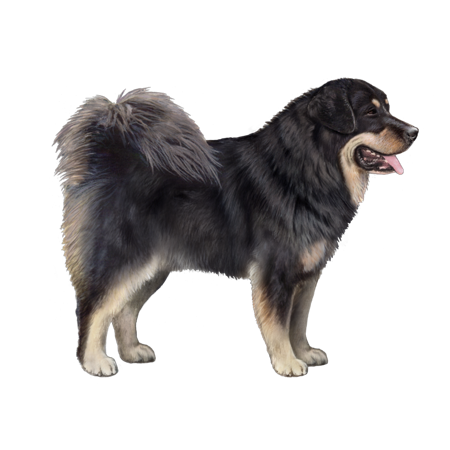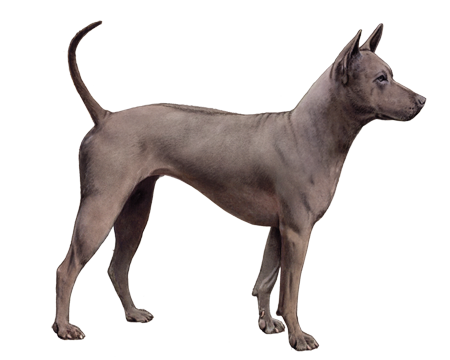
New Guinea Singing Dog
The primitive New Guinea Singing Dog has a lively, alert temperament and impressive vocal skills. But due to their wild roots, these pups may pose challenges for most families and do best with experienced pet parents familiar with the breed.
Interested in discovering if your dog is a New Guinea Singing Dog?
Check out Wisdom Panel's DNA tests.

New Guinea Singing Dog Traits
General Appearance
New Guinea Singing Dogs are small-to-medium-sized pups with a graceful appearance.
Coat and Coloring
The NGSD's plush double coat consists of a soft undercoat and coarse outer coat. The breed comes in various colors—including shades of red ranging from fawn to deep rust, red sable with dark brown or black tipping on the guard hairs, black and tan, and white.
Distinctive Physical Traits
NGSDs have wedge-shaped heads, small, triangular eyes, small, prick, wide-set ears, and thick, bushy tails.
New Guinea Singing Dog Temperament
New Guinea Singing Dogs are active, intelligent, and independent. They bond with their humans and happily show affection. But they don't have the same eager-to-please attitude most dogs do. And they tend to be aloof with strangers.
Singers are curious dogs that love to explore their surroundings. Combine that trait with their strong hunting instinct, and you have a dog that—when off-leash—is a significant flight risk. And once they escape or chase after something, getting them back might be a challenge.
The NGSD's prey drive also makes them a threat to small animals. And they tend to act reactively toward other dogs (especially of the same sex). For these reasons, they do best in homes without other pets.
In addition to their harmonious howls, Singers have other uncommon skills. They're adept at opening cabinet doors and can climb trees. So, tall fences without nearby trees and diligent dog-proofing are a must with this breed.

New Guinea Singing Dog History
New Guinea Singing Dogs (NGSD) are native to the Highlands of Papua New Guinea. These wild, free-roaming dogs have evolved naturally on the island over thousands of years—largely unobserved. Scientists didn't even know about the breed until the 1950s.
Sir Edward Hallstrom brought the first two dogs from Papua New Guinea to the Taronga Zoo in Australia in 1956. The majority of NGSD in North America are descendants of that pair. Experts initially believed the dogs were a distinct species. But DNA studies conducted in 2016 and 2017 revealed that they are genetically dingoes. Today, the captive population of NGSD is small, a mere ~300 dogs worldwide.
NGSD, or "Singers," are best known for their multi-pitched howls. They howl alone or in groups, with each dog having their own unique song.
New Guinea Singing Dog Care
Nutrition
New Guinea Singing Dogs thrive on a high-quality diet formulated for their life stage (e.g., puppy, adult, senior). To help them maintain a healthy weight, keep an eye on their food intake and measure their portions to avoid overfeeding. And remember, treats should make up no more than 10% of a dog's daily calories, as a guideline.
Grooming
Brush and bathe your Singer as needed to keep their coat free from dirt and loose fur. And don't forget to trim those nails. If they get too long, they may cause your pup pain or even lead to problems running or walking.
Singers will often "brush" their teeth after a meal by scraping their nails against them. It's a cute and unique behavior. But it doesn't take the place of a proper dental care routine. Professional cleanings and regular at-home teeth brushing (by a human) are the best ways to prevent dental disease.
Exercise
NGSDs are active pups that need daily exercise to stay happy and healthy. Long walks and hikes are great options to keep them fit. Just be sure to keep them on a leash when in unenclosed areas to prevent them from taking off after other critters.
Training
Though intelligent, Singers are also very independent and not overly motivated to please their people. This can make training difficult. For the best chance of success, establish yourself as the pack leader and use firm, consistent training techniques.
In addition to basic obedience training, socializing your pup when they're young will help them develop into a predictable, well-mannered adult dog.
Breed Group
Asian and Oceanian
The Asian and Oceanian group is comprised of breeds whose origins lie in Asia, which have spread as far as Australia, the islands of the Pacific, and the Arctic. This group is possibly the most ancient of all breed groups and were bred for a variety of purposes, including guarding, hunting, and as draft dogs.


























































